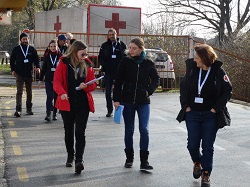SocialNet 2019: a real-life rehearsal on risk communication, community engagement and social science for the COVID-19 pandemic

WHO/Europe
“When COVID-19 emerged, we quickly committed to daily press conferences and answered each and every question. If we didn’t have the answer, we said so honestly and promised to get more information as soon as possible,” says Oskars Sneiders, Head of the Communication Division in the Latvian Ministry of Health. “We saw a strong effect: people really listened and followed our recommendations, which has helped us to keep case numbers down so far.”
Oskars was able to effectively apply the risk communication principles of transparency and early announcement to COVID-19 response after completing SocialNet 2019, a simulated WHO public health emergency training that brought together participants from 20 countries and territories across the European Region to Belgrade, Serbia, in December 2019.
New report released
In releasing the SocialNet 2019 report today, WHO/Europe documents the results of the training on social science, risk communication and community engagement (RCCE) in public health emergencies. Without knowing it, the 50 European experts in communication, public health and epidemiology who gathered in Belgrade were also rehearsing for the first coronavirus pandemic in history that would start only a few days later.
Oskars and other SocialNet participants were hand-selected from public health authorities and WHO Country Offices in central and eastern Europe. They joined the training under the umbrella of the International Health Regulations (2005) and the Pandemic Influenza Preparedness Framework, and were joined by a unique team of facilitators and trainers from WHO, UNICEF, European Centre for Disease Prevention and Control (ECDC) and the United States-based Centers for Disease Control and Prevention (CDC) – a combination of partners and expertise not seen before during trainings in the WHO European Region.



